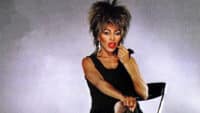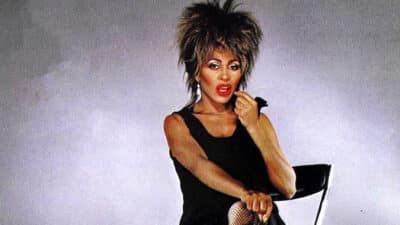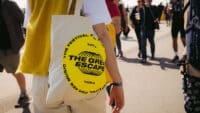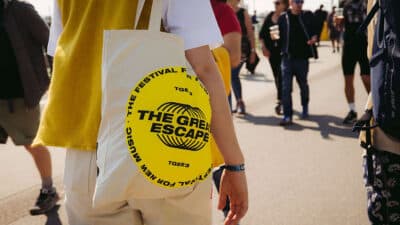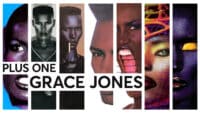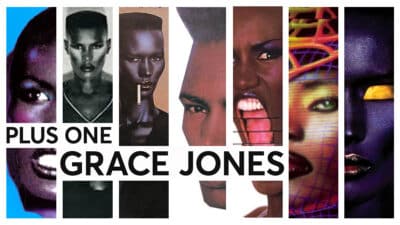Interview

Interview
Yard Act: “It’d be dishonest to write The Overload again”
James Smith on opening his eyes to the world on the forthcoming second LP, plus fatherhood, and the death of the trench coat
Sometimes hype around a band comes and just… passes. When it came to Yard Act in early 2020, the Leeds four-piece grabbed onto it so hard they were only in for the whole ride, all or nothing. Their debut, The Overload, cemented this grasp, earning them a Mercury nomination and a host of big name plaudits as they toured relentlessly and shot up festival bills.
This year they rise even higher up the ranks at the likes of Bearded Theory, Dot to Dot and Reading and Leeds festivals. As they warm up for the summer with a few UK headline dates, we catch up with frontman James Smith about readjusting for a sophomore, the effects of fatherhood, post-punk and satire, and being proud of the men his bandmates are becoming.
The Overload introduced the world to your conversational style. You’ve had a busy time since its release, did you have to adapt your writing style for the second album?
Absolutely yeah. Seeing a lot more of the world opened me up to how small my view of it was. It helped me reevaluate what I can write about, and I think it’d be dishonest to write The Overload again because I’ve spent the last 18 months out of the loop with the life I used to live. Travelling from country to country, city to city, I’ve been very fortunate to not have to look at the news; I feel detached from the general state of play of things and I’m kind of grateful for it because I think it’s saved my brain a lot of trauma.
I’ve written about what I know and I hope I’ve done it in an interesting and empathetic way, because I have basically written about being on tour and being away from my family. It’s almost immediate eye rolls when a band starts writing about the burdens of being in a band, you know what I mean? This is one of the first interviews I’ve done where I’ve mentioned it and now I’ve just said it out loud I’m going, ‘that is sh*t’. But no, there’s a narrative to it. I’m not going to go and live in the rainforest and find myself or anything, but I think it’s opened me up to more universal feelings. It’s about how I can articulate my world view and be more vulnerable with my own emotions than I was on the first album. There are still stories, I’ve drawn from my past again, a couple of tracks dig into childhood incidents that I’ve written into stories.
The rest is a skewered take on the pain you still feel, and the burden of life, after you get everything you’ve told yourself you want since you’re a teenager. When it finally happens you realise it doesn’t solve all of your problems, so it’s kind of an album about coping with what comes after your own version of happily ever after I guess. There’s still, touch wood, a lot of humour in it. It’s not dreary, but it’s definitely more open than the first album.
In the last year you’ve made a few references to a concept based around a U2 roadie who names his kid Bono. How did the record springboard from that?
When we were writing the album I didn’t know what I was going to write about. We were just kicking a couple of different musical ideas about. I was in story mode because of the first album I guess. Sometimes you can fall into a pattern because of what people liked about your first work. So I was writing these stories, and the Bono narrative actually came because Bono was a placeholder in a lyric for a character in a song that didn’t make the album. Musically it’s really good so I’m hoping something comes of that at some point.
But as it went on I realised I was just writing all these songs about doing a job that means you’re away from your family and your young child. I realised that I didn’t need to write about fictional characters to write about that, so it was all stripped away. The bare bones of those narratives are just me, and that’s what I’ve written about, with the characters and the stories being replaced by more personal observations from a first person perspective.
You’re a father yourself now…
Yeah and it changed everything. It will forever be entwined with me starting this band as a job. With touring being such an integral part of financial survival for full-time musicians, his life is forever going to be entwined with my coming and going. So that’s quite an interesting dynamic to observe. The irregularity of the patterns is actually quite comforting to me, despite the fact I wish I could be home more. I think a steady structure actually crushes me a little bit, so I think it works well. Me and my wife obviously wish we had more time together, and I wish I was home with Ben more, but at the same time I also know it’s right for me.
You’ve mentioned before that though you were happy for the praise, some people got the wrong end of the stick by looking at you as a kind of spokesman for the times. There’s that Armando Iannucci quote about living in an age of absurdity beyond the realm of satire; have you found that yourself when trying take in the state of affairs of the last two years into your music?
Absolutely. I think I’d align myself more closely with Iannucci than any post-punk band that writes about similar things, because I think satire is probably my favourite vehicle for sending a message, more so than straight up anger. I’m very wary of falling into the tropes. It feels bad because things are getting worse, but we didn’t want to repeat ourselves and it felt like it would be getting disingenuous to just carry on writing these songs. I mean, there were only a couple of songs on The Overload that were directly about the government really, ‘Dead Horse’ and ‘Land Of The Blind’ were the two that took shots at Tory rule. The rest of the album was essentially against capitalism, which has existed for far longer than the government of the last 12 years. We got to that point because of New Labour and Thatcher and you know, it’s the culmination of Neo-Liberalism overruling what could have been communism I guess.
I feel like I’m floating at the moment. I know in my core what I believe in but I don’t know how to achieve it, or how to apply it to the current situation that we live in. I don’t see any cracks of light beyond that indistinguishable hope that we have as humans to carry on. I don’t see an avenue out of where we’re currently at; I think it’s probably gonna be societal breakdown and rebuilding from that, but that doesn’t help everyone that’s struggling now. It’s been building to this point for so long, and it’s much bigger than that. I think maybe The Overload spoke to the times a little bit; it was always about human greed and asking if there’s something beyond capitalism.
The second album probably depends on that even further, because it finds hope in love. I can’t believe I just said those words in an interview, I’ve f*cked it! But the only thing that you can hold on to is hope, and everything at its core is hope and fear. Hope is love, fear is selfishness and hate, and we’re all on that spectrum trying to battle with it. It feels like fear and hate have been winning for a long time, but the heavier they get the easier it is to lean on them. Even if you’re a nice person who doesn’t believe this or that, you’re still looking after yourself first and foremost, and everyone does that as much as they wouldn’t like to admit it.
You do poke fun at things, not least post-punk tropes with the trench coat and over-egging your accent on certain words. Do you still feel wedded to those props as you move towards the second stage of Yard Act?
My accent’s my accent, but there were lines on that album that we recorded to sound more like Mark E. Smith to wind people up a little bit. But that was because after the first few singles the same comparisons dropped time and time again, so we just decided to sling it all the wall. But the next single is called ‘Trench Coat Museum’, and I think symbolically we’re gonna set fire to the trench coat. Maybe we won’t be able to do it on stage because of health and safety, maybe we’ll have to take it to the car park and do it, but the honest truth is that I just like wearing a trench coat. It sat quite nicely on my shoulders and it felt a bit like a cape or a cloak. I wear it when I go on stage and feel like I can be this character that is an exaggerated version of me. That’s a protective thing as well, I guess, a way of distancing myself from how I am on stage – which is a lot more obnoxious, I hope, than I am face-to-face with people.
I’d been in post-punk bands when it wasn’t cool and we knew it inside out. We lean into it because we know how to do it, but it was just a vehicle for ideas, basically. I know bands get really defensive about being unique and original and they get annoyed about being pigeonholed or compared to other bands, but I have confidence within me that we have more going on than that. I know what we all listen to, I know how we discuss making music and that we know what we’re doing, and over time we’re gonna grow and evolve. So I don’t feel bound by that genre, it doesn’t really annoy me when people compare us to others, because yeah, fair enough, in that moment we did. But I know we won’t sound like that forever.

On listening to music, tell me a bit more about your label Zen F.C.
We’re always listening to new stuff, it’s me and Ryan [bass] that run the label. We can’t do as much as we’d like to do because it wouldn’t be beneficial for the artist, for our bank accounts, or for us, because we’re pretty run ragged on time. But if something catches us and we know we can do something to help someone a little bit, then we’re happy to put our own money into that. We do care about music and I’ve always been interested in championing what I like and sharing it as much as I can.
When it started, the first release we did was Baba Ali, who we’d taken on tour with us. They’ve got this punk abrasiveness at their core, but there’s a lot of electronic and electro stuff seeped into it, and that kind of continued with Benefits and Nuha Ruby Ra. Acid Klaus was the first long play we put out and it arrived at the point where we realised we kind of had a running theme to the label, and that we were curating a sound. It’s got an electronic edge to it I guess, I can see an identity to it and I’m excited to do more with it.
What’s been the most bonkers moment of being in Yard Act?
There’s been some really weird ones. The Elton John one, where he just walked into the studio, sat at the piano and offered us a crisp and said “What are we doing then?”. That was like, what the f*ck is going on here, that’s Elton John! But it evaporates so fast when you realise that what Elton John is is not who Elton John is when you’re sitting face-to-face with him; like anyone else, he’s just a human being.
Doing the video with David Thewlis in Blackpool too. He just came and hung out in this community centre all day, did his video on this estate which wasn’t far from he grew up. We saw him in Sydney when we were out there, so we remained friends, and that’s ace. We went to Beck’s house in LA, that was funny. We went for a couple of drinks at his house after our show, that was bizarre.
Those things are cool, but they’re not really what you remember. On one hand, I can’t remember a lot of the last two years because it’s been so intense, but on the other, you never really know how well you’re gonna get on with a bunch of people when you spend that much time with them. You know, we were all friends beforehand, but nobody’s been put in that situation where they spend that much time together until they go on tour. I think the thing that I take away from it now, rather than a singular moment, is that our friendships have grown ten times stronger. I think we’ve grown as people and learnt how to be just better with others. It’s a really positive atmosphere of a bunch of men looking after each other, which is really nice. I’m really proud of these men that are being decent. It’s constant f*cking jokes and everyone’s got each other’s backs. It’s lovely.
I’ve got to ask, what happened with all those limes in the end?
I didn’t know there was a lime shortage in New Zealand! It was £4 a lime! We have ten limes on our rider because we tend to make margaritas and obviously you consider a lime to be a low-cost item. We got this email through saying, “Would you consider having half the amount of limes?” We were like, well we kinda need them all. But when they told us they were £4 each it was like ohh… then we won’t have any limes. Save them for the people who’ve got scurvy, we’ll just have a different drink when we’re in Auckland. But then we didn’t even do that festival – our plane got turned around mid-air because of flooding. We were halfway across from Dubai, we’d been up eight hours, and the captain just announced that Auckland airport was flooded. Everyone laughed and then there was just silence. The plane did a U-y and we flew back to Dubai.
Yard Act are on a UK tour before playing Bearded Theory and Dot to Dot festivals at the end of May – find tickets here
Yard Act are also playing Reading and Leeds festival in August – tickets here




